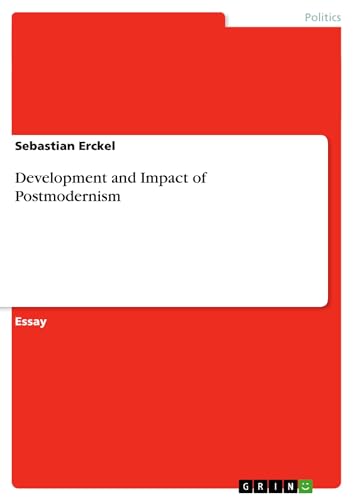Development and Impact of Postmodernism - Softcover

"synopsis" may belong to another edition of this title.
- PublisherGRIN Publishing
- Publication date2009
- ISBN 10 3640325915
- ISBN 13 9783640325917
- BindingPaperback
- Number of pages36
Buy New
Learn more about this copy
Shipping:
US$ 24.74
From Germany to U.S.A.
Top Search Results from the AbeBooks Marketplace
Development and Impact of Postmodernism
Book Description Taschenbuch. Condition: Neu. This item is printed on demand - it takes 3-4 days longer - Neuware -Essay from the year 2008 in the subject Politics - Political Theory and the History of Ideas Journal, grade: 80%=good, University of Kerala (Department of Political Science), course: Modern Political Analysis, language: English, abstract: Few people would deny that they are living in an age of great transformational processes. For centuries, if not millennia, the changes in human society had occurred slowly and usually did not affect the lives of the majority of the people significantly. That is not to say that the event of a war, a draught or another catastrophe did not have devastating consequences and indeed it were predominantly the ordinary people who suffered the most if such an event took place. The conducting of life however remained unaffected and continued as it had before. Scientific inventions were rarely made and if they did happen it was only a small privileged section of society benefiting from them. Whatever influenced the life of most people occurred gradually, making it both possible and easy to adjust. It could even be argued that because these influences did not have an impact during a person's lifespan but developed over generations people failed to recognize them as changes at all. This has profoundly changed in the age of globalization that has already shaped the economic, social, and cultural lives of hundreds of millions of people. The majority of them may not be able to clearly identify these changes but they would all agree that something is happening in their lives. The feeling evolving out of this is one of uncertainty; there are both greater opportunities and greater risks. The previous era had already witnessed the transformation that industrialization brought about and it provoked sharp reactions. Industrialization not only transformed people's lives it changed the character of warfare as well and the 20th century had to endure the consequences. Technology brought many improvements but people start to realize that there is a flipside to everything. In a somewhat dialectical sense we cannot take the benefits of something while at the same time hope to avoid the ramifications. The world today has not just become smaller; it also turns out to be far more complex and diverse than any philosopher could have possibly imagined. Postmodernism can be conceived as a movement directed at both diversity and complexity but it may not provide a satisfying answer. Instead, its simple but yet powerful message may be that all we can do is accept the actual condition. This paper attempts to outline the development of postmodernism as a reaction to Modernity, and to analyze some of the implications this reaction brings about. 20 pp. Englisch. Seller Inventory # 9783640325917
Development and Impact of Postmodernism
Book Description Taschenbuch. Condition: Neu. Druck auf Anfrage Neuware - Printed after ordering - Essay from the year 2008 in the subject Politics - Political Theory and the History of Ideas Journal, grade: 80%=good, University of Kerala (Department of Political Science), course: Modern Political Analysis, language: English, abstract: Few people would deny that they are living in an age of great transformational processes. For centuries, if not millennia, the changes in human society had occurred slowly and usually did not affect the lives of the majority of the people significantly. That is not to say that the event of a war, a draught or another catastrophe did not have devastating consequences and indeed it were predominantly the ordinary people who suffered the most if such an event took place. The conducting of life however remained unaffected and continued as it had before. Scientific inventions were rarely made and if they did happen it was only a small privileged section of society benefiting from them. Whatever influenced the life of most people occurred gradually, making it both possible and easy to adjust. It could even be argued that because these influences did not have an impact during a person's lifespan but developed over generations people failed to recognize them as changes at all. This has profoundly changed in the age of globalization that has already shaped the economic, social, and cultural lives of hundreds of millions of people. The majority of them may not be able to clearly identify these changes but they would all agree that something is happening in their lives. The feeling evolving out of this is one of uncertainty; there are both greater opportunities and greater risks. The previous era had already witnessed the transformation that industrialization brought about and it provoked sharp reactions. Industrialization not only transformed people's lives it changed the character of warfare as well and the 20th century had to endure the consequences. Technology brought many improvements but people start to realize that there is a flipside to everything. In a somewhat dialectical sense we cannot take the benefits of something while at the same time hope to avoid the ramifications. The world today has not just become smaller; it also turns out to be far more complex and diverse than any philosopher could have possibly imagined. Postmodernism can be conceived as a movement directed at both diversity and complexity but it may not provide a satisfying answer. Instead, its simple but yet powerful message may be that all we can do is accept the actual condition. This paper attempts to outline the development of postmodernism as a reaction to Modernity, and to analyze some of the implications this reaction brings about. Seller Inventory # 9783640325917

